Review for Metropolis: Special Edition - Reconstructed and Restored - The Masters of Cinema Series
Introduction
I'm a science fiction fan that has never seen Metropolis! There, I've said it. I mean, I've seen Metropolis, who hasn't? The iconic imagery is such a mainstay of modern popular culture, even now over eighty years after the film was made, that it is as much part of our cultural DNA as the Bible or the Beatles. You don't have to physically experience it to be aware of it and its impact. And I've seen clips of the film in documentaries along with everyone else, I've seen the influence and the legacy, in films like Blade Runner, Star Wars, The Fifth Element, in music videos such as Madonna's Express Yourself, or Queen's Radio Gaga. Metropolis was one of those epochal moments in cinema that changed everything that came after it. The story is that the godfather of anime, Osamu Tezuka happened to see the poster for Metropolis when he was younger, and just that poster alone inspired him to create a manga, which after his death was turned in an anime feature film by Rintaro. I've reviewed the anime Metropolis for this site, and it is a perennial favourite of mine. I'm sure that as a child, a confluence of a television broadcast of the Fritz Lang film, and me sat in a room did occur on at least one occasion, and that definitely had a visceral, visual impact, even if I can recall little of the story. But it could be said that until 2008, few people alive now had seen Metropolis, at least not as the director had intended.
Like most groundbreaking cinema, Metropolis was a flop. The film was the most expensive film ever at the time, and long at over three hours. It almost bankrupted its studio Ufa, and it confuddled audiences at its premiere in Berlin in January 1927. For the US release, Paramount took the scissors to the film and edited out a quarter of the length, and Ufa followed suit in Germany, and those 25 minutes of the film were considered lost ever since. Subsequent releases of the film have had varying edits and cuts, including a version with 'Hal Roach' style comedy music, and in 1984, Giorgio Moroder released a pop version of the film, just 87 minutes in length with tinted visuals, and a score from contemporary music artists. But for almost as long as Metropolis has been reworked, attempts have been made at restoring the film to the original vision intended by Fritz Lang. Film enthusiasts have scoured the globe looking for lost footage, and trying to reconstruct the film. For the 75th anniversary, the Friedrich Wilhelm Murnau Foundation undertook a restoration and reconstruction of the film, digitally restoring the print to the best quality possible, and putting it back together in the correct order, with intertitles describing the lost scenes. In 2002 it was considered as close to definitive as we were going to get.
Then in 2008 something remarkable happened. In a museum in Buenos Aires, a copy of Metropolis was rediscovered. Instead of the edited version, the complete film had been sent by mistake to Argentina in 1928, and it had fallen into the hands of a collector. By the seventies, the original nitrate film was falling to the ravages of time, so a 16mm copy was made, and it was this 16mm copy that had lain, gathering dust ever since. It's like finding the cinematic Holy Grail. For the first time in 80 years, the almost complete Metropolis is available. It isn't perfect. Because it comes from a duplicate, damage that was duplicated can't be removed, the aspect ratio of the 16mm print means that picture information has been lost, and a couple of scenes are still missing. But the film restorers have worked wonders with what they did have, and at 150 minutes in length, this is as close to complete as you could possibly hope for after this length of time. The original Gottfried Huppertz score was rerecorded this year by a symphony orchestra, meaning you can now watch Metropolis with music in surround sound and digital clarity. The film got its second premiere earlier this year, 83 years after the first, and the new HD print means we can now partake of Metropolis on both Blu-ray as well as this DVD that I am reviewing.
Metropolis is the city of the future, brainchild of its founder, Joh Fredersen, who rules over a perfect idyll where the elite live lives of indolence, ease and leisure. It's a veritable Eden where the children of the Gods frolic. That's up above, down below in the undercity is where the workers toil ceaselessly to keep the city running, out of sight and out of mind of the ruling class. Joh's son Freder is happy to partake of the comforts that his position in life afford him. That's until the day that the doors open, and a girl leading a gaggle of grimy children appears. She's there to show her charges how their brothers and sisters live up above, and from that moment Freder is smitten. The girl and the children are quickly bustled back underground, but Freder, determined to find the girl, Maria follows her down into the depths of the city. He's shocked to come face to face with the reality of the foundations of his heavenly existence, the workers, toiling like slaves, and metaphorically being sacrificed to the machine that is City. He confronts his father with what he has seen, but is met with indifference. The elite care not for what drives their society, while the workers resent their apathetic overseers. Only Maria counsels another way. There must be a mediator, someone to bridge the gap between the workers and the elite, to reshape society so that it is fairer for all. And it is she who advises the workers to wait for such a mediator to appear.
Such thoughts pose a danger to the society that Joh Fredersen has created, and he needs a weapon against such philosophies. The inventor Rotwang was a rival to Fredersen, for the love of Freder's mother Hel. Hel died in childbirth, but the grief and antagonism between the two men has lasted ever since. But Rotwang's love for Hel has driven him to his ultimate creation, a man-machine that he will give Hel's likeness to, so that she may live again. But seeing this robot gives Fredersen an idea. Given Maria's likeness instead, the robot can take her place in the undercity, and sow seeds of dissent and discord among the workers, destroying Maria's dreams of a re-ordered society.
Picture
Metropolis gets a 4:3 regular transfer on an NTSC disc, and it's monochrome of course. I don't actually begrudge the NTSC format this time around, as it runs at 24 frames per second as opposed to PAL's 25. Silent films of this era were supposed to be projected at around 18 frames per second, which is why we have so often become accustomed to seeing things move so quickly in silent films. The second hand on the clock in Fredersen's office is an indication of that. It explains why the complete film's runtime back in 1927 was three hours plus, and why on an NTSC disc it's at 2 and half hours. Speeding it up even further for a PAL disc would have been counterproductive. I do wonder what it would look like at the correct frame rate, but I guess that eyes that are accustomed to viewing images at 24 fps would have a lot of flicker to contend with.
The image quality is as variable as you would expect given the nature of the film. The original footage that has always been available is astonishing. It's been cleaned up, the damage removed and has a clarity and definition that is breathtaking given the film's age. The contrast levels are good, and the detail and visual splendour of the film just explodes off the screen. You truly get to appreciate the sets, the visual design, and the grand scope of the film's creation. The found footage from the Buenos Aires print is awful in comparison, but probably what you would expect a silent movie to look like. The 16mm source means that picture image has been lost to cropping, and the film indicates this with a black bar where the lost image should be. It's grainy, scratched and murky, and that's following restoration. But the restoration of the footage means that the story is almost complete, plotlines and characters practically excised from the original have been restored, and you very quickly forget the quality of the footage. A couple of scenes remain absent, and intertitles appear to describe what happens. Given how amazing the film looks on DVD, it must look absolutely stunning given the higher definition of Blu-ray.
Sound
You have a choice between DD 5.1 Surround and DD 2.0 Stereo. The original 1927 score was recorded again this year, so you get the sound in full, modern technical clarity. It's a grand, operatic and emotive symphony that drives the film, and there isn't any of the disconnect that I expected, watching an eighty-year old silent film, with 21st Century digital surround sound. In fact, given the restored visual quality, I almost felt as if I was watching a new film. The intertitles are in the original German (translated from Spanish when it comes to the Buenos Aires print), and are translated into English on the subtitle stream. You can turn the subtitles off if you are fluent.
Extras
You have the choice of DVD and Blu-ray on the day of release, with cases presented in a wraparound embossed sleeve. There is also a limited edition steelbook dual format edition released on the same day.
There's no messing about with the DVD, put it in, and it goes straight to the static menu screen and it's a matter of just pressing Play and you're off. When you stop the disc, there is a jacket picture featuring the cover art to look at.
On the disc, you'll find the audio commentary, recorded in March 2010 by Jonathan Rosenbaum and David Kalat. It isn't the most ideal of audio recordings, as there is a bit of echo, but their comments are clear throughout. They provide a look at the film's history, and the critical response down the years. They talk about the various versions of the film, and compare it to the novel. It's not necessarily scene specific, but it is a very entertaining, and informative commentary, well worth listening to.
Die Riese nach Metropolis is a 55-minute documentary that looks at the making of the film, the stories around it and how it was treated following its release, and the long road to restoration, culminating with that serendipitous discovery in Argentina. There's plenty of interest here, including vintage interviews with Fritz Lang. It's stunning to hear just how much of a flop Metropolis initially was, costing 5 million Reichmarks, it earned just 75000 in its first year of release. This featurette is presented in anamorphic widescreen, with German audio and English subtitles.
You'll also find the 2010 trailer for the restored Metropolis, running to 2 minutes.
There is a 56-page booklet with the DVD replete with essays about the film. I only read the PDF of the booklet, but judging by the quality of the PR material sent with the check-disc, it ought to be lush. In it, Jonathan Rosenbaum offers a contemporary review of the film in Unified Theory, What I Have Left To Say is Fritz Lang's statement on the release of the film, Metropolis is a review at the time by Luis Bunuel, The Metropolis Mystery is an account by Karen Naundorf of the discovery of the lost footage in 2008, and Metropolis: Reconstruction and Restoration by Martin Koerber looks at the how the film on this DVD was re-created. The booklet also has production stills, and promotional artwork from the film to illustrate it.
Conclusion
I thought Metropolis was supposed to be a science fiction movie. It turns out that as a silent film, its interpretation is in the eye of the beholder to a great degree, and where many see an early sci-fi classic, with its grand vision of an urban paradise, a city of glass and steel, connected by futuristic mass transit, many more will see great social commentary in the divide between the haves and the have nots. The elite and powerful live carefree lives in their ivory towers, while the majority toil away keeping the engine of civilisation ticking over. Others will see a somewhat prescient warning of the dangers of industrialisation, the erosion of nature, of free will, of imagination, until we all become slaves worshipping at the altar of machines (he says, head bowed down over a keyboard, penitent before a glowing monitor). There is also equally valid commentary on how mobs can be moved, can be manipulated by the right man, pulling the right lever. Given what was happening, and what was about to happen in Germany when this film was made, it sends a chill down the spine to read how this film was a favourite of Adolf Hitler. There is also the love story, the passion that Freder develops for Maria that sends him on his voyage of discovery into the depths of the city, and the bitter rivalry between Joh Fredersen and Rotwang over their love for one woman, Hel, and whose memory drives both men to irrational acts, and Rotwang to a bitter revenge. What I saw most strongly in Metropolis when I watched it was not a vision of the future, but an echo of the past, a retelling of biblical tales, another expulsion from Paradise. The thing is that all of these aspects are valid interpretations of the film, which is no doubt why it has remained so strong through the years, and why it can be seen as relevant even today.
It's a blending of biblical tales that informs Metropolis' story, not just one, but I find that even among the artifice of future architecture, there is such a profusion of religious imagery, that it feels like a very old and archetypal tale. And that's beyond the obvious allegory to the Tower of Babel that Maria uses as her sermon to the workers, describing the gulf between the rulers and the people that make the city work. Metropolis as we encounter it is a paradise, an Eden where the rich and well-to-do frolic, and where the son of the city's founder, Freder is treated like a prince, his every whim catered for. Yet the rich turn a blind eye to those that make their idyll possible. This isn't automation to free humanity (or put people on the dole line) as has actually happened, this is mechanisation to enslave humanity, and just like the slaves of Egypt, it's their labours on which the elegance and grandeur of the city rests. Their work is tiring, backbreaking, repetitive and menial, designed to sap their souls and make them as much automata as the machinery they labour at.
But amongst the workers is the angelic Maria, a prophet of sorts, preaching a better world where the workers and the rulers are united in common cause, rather than divided by the upper and lower levels of the city. Yet she awaits a Messiah to unite the people, not intending to accomplish it herself. And Freder, just like Moses born to wealth, and then cast among the slaves, turns out to be that Messiah. But where there is the angelic Maria, there is the temptress Maria as well. Of course, the robot created by Rotwang is a forerunner of countless automata in cinema and literature, whether it be Asimov's robots, C3PO or even the Terminator, but with the mad scientist it also harks back to the iconic tale of Frankenstein and his monster. Yet with the absurd spectacle of an ancient cottage in a modern city, the prevalence of pentagrams and the magical air of the alchemist about him, it also speaks of the ancient legend of the Golem, again in keeping with the religious and mythological overtones of the story.
There is the cathedral, a gothic edifice that serves as one of the locations of the story, also contributing to the images and ideas that drive it, with a representation of the seven deadly sins, personified in statue form, arrayed around the figure of death. It's the robotic Maria that brings these fundamental human flaws back to the denizens of Metropolis. Following Joh Fredersen's self-defeating dictates, she sows seeds of discord and rebellion among the workers, while at the same time, following the path of Rotwang's vengeance, she brings sin back into the heart of the elite, a seductress that draws out the darker aspects of man, sending the rich and indolent down a spiral of self-destructive decadence, as they allow their own passions to consume them. The end comes in the most biblical of ways, an all consuming flood, and as in all such tales, it's only through complete destruction of that which has stood before, that the shoots of something new, something better can begin to grow.
But as I said, Metropolis is in the eye of the beholder, and there are probably as many different interpretations as there are opinions of the film. And even as I saw Fredersen use the robotic Maria to infiltrate and sabotage the workers movement, I was put in mind of the Miners' Strike of the eighties and how the government of the time used it as an excuse to destroy this nation's mining industry. Fast-forward thirty years, and we have another era of austerity, of government cuts and inevitable social upheaval. I saw the students' demonstration get out of hand on the news, and once again I thought of this film. If any film can have relevance after 83 years, it surely bears further examination.
Not that Metropolis is perfect by any means. Having grown up with a different cinematic education, I'm not quite as cultured with the language of silent movies, the melodrama and grand gestures, the unsubtle display of histrionics that most characters have to display. But even taking that into account, I find the actions of the major groups in this film, the workers and the elite to be simplistic and contrived, even beyond the confines of mob mentality. The way that the robotic Maria casts a glamour among the elite, the way she so effortless drives the workers to self-destructive riots seem very much to me a case of the story dictating what the characters do and feel, rather than the other way around. Also Freder as a character was a little too gormless for me, driven by the story rather than able to move it himself. He was an everyman, our window into this future world, and as such he served adequately, but it takes a little more suspension of disbelief than I have to accept that he is the Heart that can mediate between Head and Hand.
Metropolis is still an amazing film after all these years, but more than that, it is a historical document, an epochal moment in cinema that changed everything that came afterwards. As such it is immune to criticism. I have insufficient recollection of the film to comment on how much this 'complete' version adds, but that I was rapt and glued to the screen for the runtime is surely an indication of the film's power. Even after 83 years, Metropolis has a lot to offer. It's a gem worthy of rediscovery.
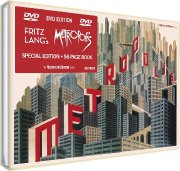
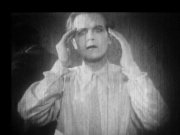
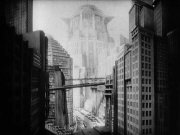

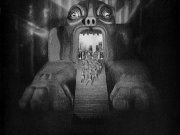





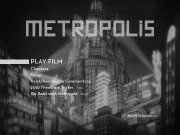
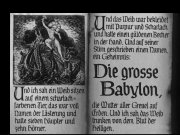

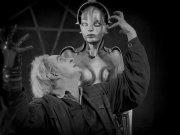
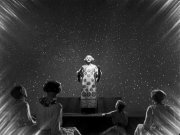
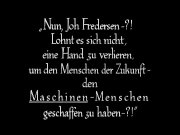
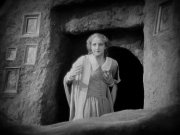
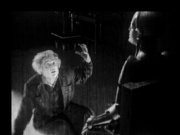


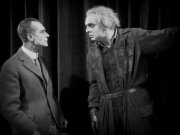
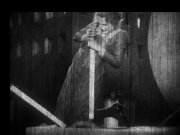

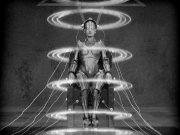

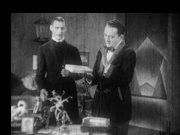



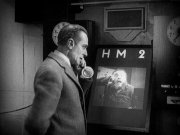

















































Your Opinions and Comments